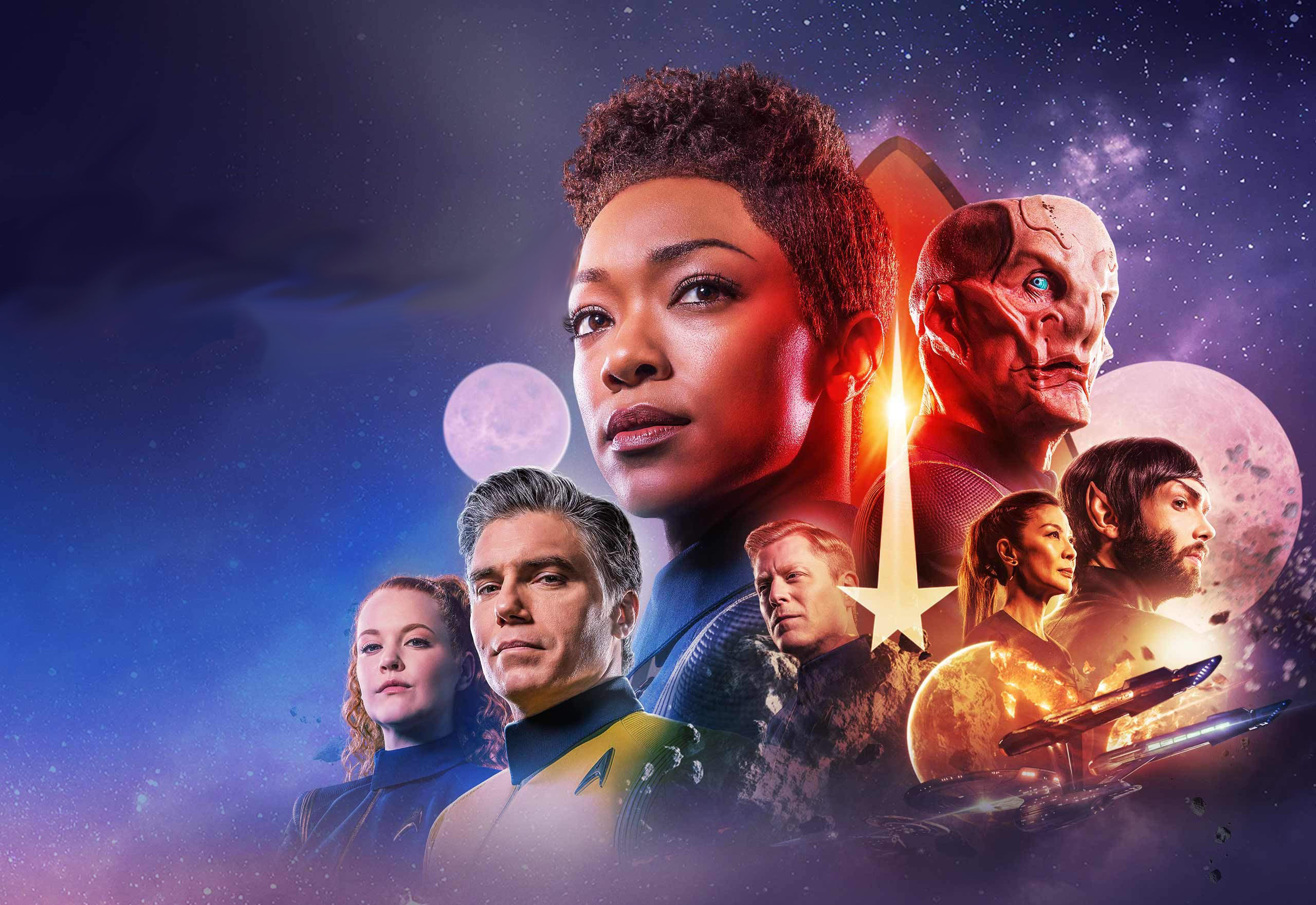The second season of Star Trek: Discovery ended with a major cliff-hanger: Michael Burnham and the gang catapulted through space and time and we have no idea where/if/when they will end up.
To get to this moment, they had to battle artificial intelligence hell bent on “destroying all sentient life,” chase down an emo Spock and deal with his daddy-issues, solve the mystery of Michael’s parents (including finding her mother alive before losing her again), and that’s not all.
Lots of questions remain: is Control really dead? Why did Spock and friends have to vow never to speak of Discovery again (other than the show’s creators trying to explain why we never knew Spock had a sister before)? And speaking of Spock’s family, how did Sarek and Amanda manage to visit Discovery on the eve of battle but not get any ships to help? Is Captain Pike really doomed to the horrible fate he saw in the time crystal? How can we get more or Rebecca Romijn’s Number One (hair, make-up, and attitude)? Will we see more of Ash Tyler and Section 31 (or in Georgiou’s spinoff)? Was all of season two just an extended Spock (or Borg) creation story?
But, for fans of Discovery planning to tune into season three like me, the central question remains: what is in store for Michael and the crew? The finale made it clear they could go anywhere in space or time. The only hint was the possibility of finding themselves on Terralysium again. Remember it’s the Earth-like planet in the far-flung Beta Quadrant housing the few thousand technology-less humans rescued by Burham’s mother from an earlier, darker time in human history.
There are some upsides to this possibility: We could see more of Burnham’s mother, Dr. Gabrielle Burnham (I guess the lady astrophysicists of the future still take their husband’s last names) played by the formidable Sonja Sohn. Every moment she was on screen was electrifying and her newly-resumed relationship with Michael certainly deserves deeper exploration.
We’d also get to see how the Discovery crew (all of them seemingly scientists, engineers, and computer lovers) would survive without technology. I can’t imagine the next season will consist of them learning to grow potatoes so there is a certain Battlestar Galactica-y appeal in seeing them figure out how to live without a network. In this scenario, Discovery could delve into questions about the role of technology in our lives: what makes us stronger versus what makes us weaker? What is essential and what are we better off without? How do you keep growing if the ways in which we grow (aka technology) end up destroying us?
Alternatively, if Control really is “dead” a trip to Terralysium could put Burnham and crew on more of a Voyager–like trajectory, battling to get home (assuming the spore drive is unusable now). If that’s the way we go, Discoverycould focus on issues of identity when so many of the traditional markers are gone. Do they stay in uniform? How do they pick a captain without Star Fleet? What does this mean for our favorite mutineer? The list goes on.
Personally, having spent the first two seasons of Discovery in the decades prior to the original Star Trek, I’d like to see the show move from prequel to sequel. Wouldn’t it be fun to catch up with Sisco, Janeway, Worf, etc. in their later years? I hear Jean Luc Picard is getting a series along those lines — perhaps Discovery could jump-start that process by taking us first to Bajor. Let’s see what Kira Nerys is up to. I can’t imagine she had kids, but wouldn’t she be a hilarious mother/grandmother? Her future could provide such interesting context into what warriors do after the war, how societies build after they’ve met their Gods. Certainly, in these troubling times, our world could use the critique of capitalism that Quark and the Ferengis always provide. How would Michael and Saru and Tully even respond to our favorite large-eared aliens? It would be so ripe!
But as much fun as that’d be, the truth is, I don’t actually care about where or when Discovery goes. I do care that the show embeds in its journey the big questions Star Trek is so good at asking about humanity and progress and morality. Don’t get me wrong, I like the Star Trek nostalgia Discovery offers, bringing me back on-board the space ships with their form-fitting uniforms, far out noises, and familiar characters. But I LOVE Star Trek’s morally based storytelling, its optimism about humanity paired with its willingness to take a hard look in the mirror (remember how Generations premiered with Q putting the entire human race on trial?).
We’re in the era of prestige television — it’d be a shame for the Star Trek franchise to abandon what made it so good, so timeless, and so influential to begin with. Discovery hasn’t gone deep on the big questions yet but it’s not too late. Let season three boldly go into the intellectual, the nerdy, the moral quandary. It’s the biggest adventure of them all.

